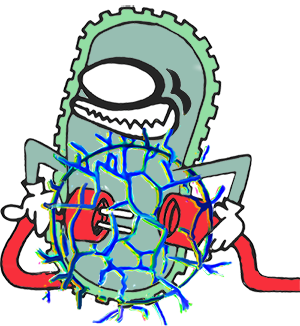Team:TU Delft-Leiden/Media
From 2014.igem.org
EsraBekdas (Talk | contribs) |
EsraBekdas (Talk | contribs) |
||
| Line 47: | Line 47: | ||
<h3>Social Media</h3> | <h3>Social Media</h3> | ||
| - | <p>Facebook and Twitter are great examples of social networking options. It’s possible to draw the attention of a lot of people by inviting your friends to like your page. For this reason we have decided to have a Facebook and Twitter account, enabling us to keep our ‘fans’ up-to-date, during the project about the developments within the project, science and the latest publications.</p | + | <p>Facebook and Twitter are great examples of social networking options. It’s possible to draw the attention of a lot of people by inviting your friends to like your page. For this reason we have decided to have a Facebook and Twitter account, enabling us to keep our ‘fans’ up-to-date, during the project about the developments within the project, science and the latest publications.</p> |
<p>We have managed to get a lot of likes on our Facebook as well on our Twitter account. Have a look on our pages!</p> | <p>We have managed to get a lot of likes on our Facebook as well on our Twitter account. Have a look on our pages!</p> | ||
Revision as of 12:03, 16 October 2014
Media
Media outreach is one of the most important things that needs to be done to support your own public relations program of your project. This is a part of our PR program which also encompasses areas like public speaking and social media.
Many media representatives have been contacted in order to draw the public’s attention to our synthetic biology project.
Within the synthetic biology one makes use of genetic modification. But many people are scared of the term ‘genetic modification’, because they are not aware of what this actually means. However synthetic biology is a great possibility to modify organisms so we can use them in a useful way. With this iGEM project we are enable to create awareness of the importance of synthetic biology. That’s why the media outreach is a good way to let people know that genetic modification is not a bad thing!
The project of the TU Delft iGEM team 2014, Electrace, received a lot of media attention from several newspapers, scientific magazines and also biology & biotechnology associations.
Below you can find a list of our publications, please note that these are not translated since they stem from national/local newspapers, magazines and associations. We did not want to infringe on copyright laws.
October 15, 2014 : TU Delft competing at MIT by the local newspaper Delftse Post
October 9, 2014 : The scientific magazine of TU Delft, Delft Integraal, publishes about ‘mine sniffing bacteria’
September 19, 2014 : Honors students of the Rotterdam University (Hogeschool Rotterdam) reports on biosensor project of TU Delft iGEM team
September 16, 2014 : The Royal Netherlands Chemical Society (KNCV) published an interview in C2W magazine and also reported in the newsletter of the Dutch biological society
September 13, 2014 : Bionieuws: iGEM competition challenges top students. Click here for the publication!
September 9, 2014 : NOS - National news organization interviews TU Delft iGEM team
September 7, 2014 : Scientias, most popular national scientific news site, writes about 'bacteria detecting landmines'
August 17, 2014 : Mine sniffing bacteria by Delta, magazine of the TU Delft, which has also been published by TNW news!
August 11, 2014 : Engineeringnet.nl: thirteen Dutch students designing a genetically engineered machine for iGEM
July 20, 2014 : The Dutch biological society NBV reports on iGEM competition start. Click here for the publication!
July 18, 2014 : BioBased Economy writes about the TU Delft students team participating the iGEM competition. Click here for the publication!
July 10, 2014 : HollandBio association of the Dutch biotechnology industry writes about iGEM
March 26, 2014 : Rotterdam University of Applied Sciences (Hogeschool Rotterdam) publishes on collaboration with TU Delft
Have a quick look at our publications!
Social Media
Facebook and Twitter are great examples of social networking options. It’s possible to draw the attention of a lot of people by inviting your friends to like your page. For this reason we have decided to have a Facebook and Twitter account, enabling us to keep our ‘fans’ up-to-date, during the project about the developments within the project, science and the latest publications.
We have managed to get a lot of likes on our Facebook as well on our Twitter account. Have a look on our pages!
Facebook: TUDelft IGEM 2014
Twitter: @TUDelft_iGEM
 "
"






